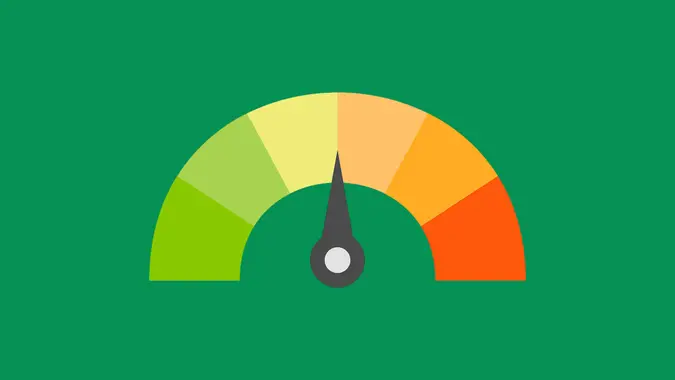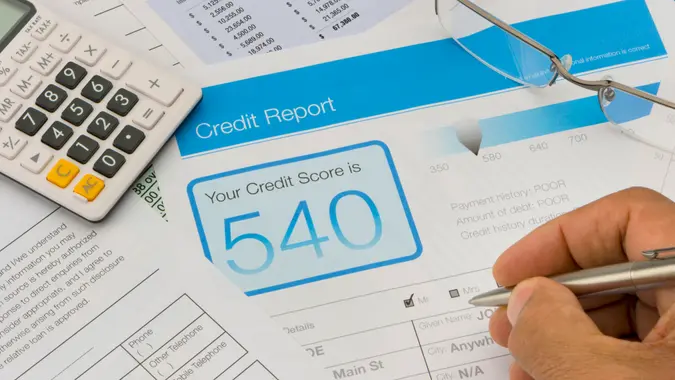How to Rebuild Your Credit: A Step-by-Step Guide for Beginners

Commitment to Our Readers
GOBankingRates' editorial team is committed to bringing you unbiased reviews and information. We use data-driven methodologies to evaluate financial products and services - our reviews and ratings are not influenced by advertisers. You can read more about our editorial guidelines and our products and services review methodology.

20 Years
Helping You Live Richer

Reviewed
by Experts

Trusted by
Millions of Readers
Financial challenges can damage your credit if they cause you to pay bills late or miss payments altogether. This is because your payment history accounts for 35% of your credit score.
Fortunately, your credit score is always changing, and you can improve it with a few proven hacks. Just as negative credit activity drags your score down, positive activity pulls it back up. The trick is to avoid further negative activity while you take steps to whip your credit into shape.
What is Credit and Why is a Good Credit Score Important?
Credit is your financial reputation. It shows lenders how responsible you are with borrowed money. Your credit score is a three-digit number that banks, landlords, and even some employers use to judge your reliability.
Good credit makes life easier by helping you:
- Get approved for credit cards and loans.
- Qualify for lower interest rates, saving you money.
- Rent an apartment with fewer hurdles.
How Credit Gets Damaged in the First Place
Bad credit usually comes from a few key mistakes:
- Late payments: Missing due dates hurts your score.
- High credit card balances: Using too much of your available credit lowers your score.
- Collections and defaults: Unpaid debts that get sent to collections stay on your report for years.
- Too many new applications: Applying for multiple credit accounts at once can signal financial trouble.
- Bankruptcy or foreclosure: These have long-lasting impacts but can still be recovered from over time.
| Good Credit Habits | Bad Credit Habits |
|---|---|
| Paying bills on time | Missing payments |
| Keeping balances low | Maxing out credit cards |
| Applying for credit sparingly | Opening multiple accounts at once |
| Checking your credit report | Ignoring your credit score |
How To Rebuild Credit
If you’re looking to fix your credit, you’ll have to come to terms with the fact that there is no such thing as a super quick fix, and how long it will take to rebuild your credit depends on why your credit score is low in the first place. For example, building credit takes a lot longer for someone who has defaulted on loans than someone who has just missed a payment or two.
The good news is that you might see slight improvement quickly, even with a poor FICO score of 580 or less. Low credit scores actually improve faster than good scores in some cases, so don’t let a 500 score discourage you from taking action.
Here are some hacks for getting your credit score on track.
1. Check Your Credit Report Along With Your Score
You can get one free credit report per year from each of the three credit bureaus at AnnualCreditReport.com. The goal is to look for inaccurate information and unpaid accounts you might’ve forgotten about. This hack will help you boost your score because you can file a dispute with the credit bureau in the case of errors. You can also contact the creditor for payment instructions.
It’s also important to check your credit score so you can track your progress. You may have to pay to see the scores creditors use, but you can access free educational scores from websites like Credit Karma to see how your score changes from month to month as you make positive changes in the way you use credit.
2. Pay Bills on Time
Payment history is a key factor in credit scores and one of the easiest ways to boost your score is to set reminders to ensure that your bills are always paid on time.
Overdue payments stay on your credit report for seven years. However, their impact on your score lessens as time goes on. Once you’ve caught up, make sure you keep all your accounts in good standing moving forward.
3. Keep Your Credit Utilization Low
Another way to hack your credit score is to lower your credit utilization ratio, which is your balance-to-limit ratio. It makes up 30% of your FICO score.
According to Fair Isaac, the company that created the FICO scoring model, moderate use of your credit cards and other lines of credit isn’t necessarily bad for your credit score. Credit problems stem from using too a high percentage of your available credit. Lenders see that as a sign that you’re overextended and at higher risk of default.
It’s important to note that your credit report can show that you have credit card balances even if you pay off your credit cards every month. You can avoid this by making your payments before the end of the statement period, when the creditor reports your account to the credit bureaus. The reported balance can affect your credit score if it represents a high percentage of your available credit.
4. Consider a Credit-Builder Loan
If you can’t get approved for a regular credit card, these options help:
- Secured credit card: You pay a deposit, which becomes your credit limit.
- Credit-builder loan: You make small monthly payments, and the lender reports them to credit bureaus.
Both options help build positive payment history, which is key to improving your score.
5. Be Careful About Applying for New Credit
You can improve your credit score by putting a stop to applying for new credit cards. Your credit report shows any applications for new credit as an inquiry, which indicates that you’re taking on new debt. Opening multiple credit accounts in a short period of time makes you a riskier borrower, especially if you have a limited credit history.
New credit makes up 10% of your FICO score, so the impact is modest. But every point counts when you’re trying to rebuild your credit, and using your existing credit shows your ability to manage it responsibly.
How Long Does It Take to Rebuild Credit?
The time it takes to improve your credit depends on how bad the damage is and how quickly you start good habits.
Typical timelines:
- Late payments: A few months.
- Collections or defaults: A year or more.
- Bankruptcy: Stays on your report for 7-10 years, but improvement can start much sooner.
No matter where you’re starting, every good financial decision moves you forward.
Extra Tips to Speed Up Credit Rebuilding
- Become an authorized user: If a family member adds you to their credit card, their good payment history can help your score.
- Report rent and utility payments: Some services allow you to add these to your credit history.
- Keep old accounts open: Older accounts help your credit age, which boosts your score.
- Be patient: Improving credit is a slow process, but the results are worth it.
Rebuilding your credit won’t happen overnight, but with consistent effort, you’ll see progress. Start with small steps, and over time, your score will improve, opening doors to better financial opportunities.
One Final Option For Boosting Credit
While improving your credit takes time to rebuild, there’s a way to increase your score quickly if you’ve taken a positive action like correcting a credit report error, bringing an account current, or paying down a credit card balance in order to qualify for a loan.
The process is called rapid rescoring, and it reduces the time it takes for your credit score to reflect the positive activity from 30 days or more to less than a week. However, it’s important to note that you can’t perform a rapid rescore on your own — you’ll need the assistance of a credit company or lender for this.
Repairing Your Credit Takes Time
Developing bad credit probably took you a while, so rebuilding will take time and energy even if you apply these hacks diligently.
However, considering how important good credit is for everything from renting an apartment to buying a car or home to applying for a new job, the steps you take to improve your credit score will be time and energy well spent.
Barri Segal and Martin Dasko contributed to the reporting for this article.
Our in-house research team and on-site financial experts work together to create content that’s accurate, impartial, and up to date. We fact-check every single statistic, quote and fact using trusted primary resources to make sure the information we provide is correct. You can learn more about GOBankingRates’ processes and standards in our editorial policy.
- myFICO. "What is Amounts Owed?"
- U.S. News & World Report. 2021. "What Is a Rapid Rescore and How Does It Work?"
 Written by
Written by  Edited by
Edited by 






















